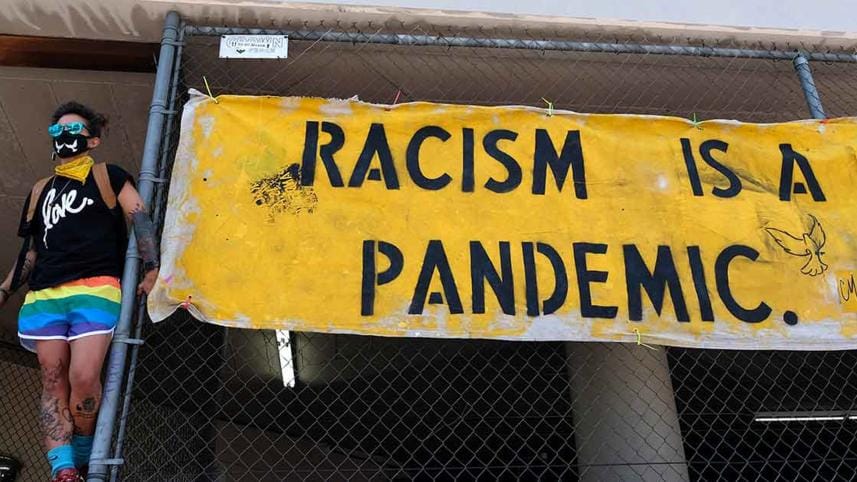The pandemic of racism

Imagine waiting for a bus at a station when someone shouts "Corona, Corona, Corona!" while pointing at you. Instantly everyone looks at you and you wish to disappear into thin air for being held responsible for a deadly virus.
While the world grapples with Covid-19, reports of racist attacks are rising globally. In the West, Asian people are getting yelled at in public spaces. In February 2020, parents refused to let doctors and nurses of "Asian appearance" at the Royal Children's hospital in Australia to treat their children. Northeastern Indians who have East Asian features have been denied health services in India.
According to the World Health Organization (WHO), social stigma in the context of health is the negative association between a person or group of people who share certain characteristics and a specific disease. They are labelled, stereotyped and discriminated against because of a perceived link with a disease.
People who don't have the disease but share other characteristics with this group may suffer from stigma. In the case of Covid-19 in Bangladesh, it mostly translates to indigenous communities or adivasis, and even the few Bengalis who have East Asian features.
According to the UN, indigenous people are inheritors and practitioners of unique cultures and ways of relating to the environment. They have retained social, cultural, economic and political characteristics that are distinct from those of the dominant societies in which they live. The same distinctive attributes are being pointed out to corner them. Statements such as "Dekho dekho Chakma jacche" (look there goes a Chakma!) are being used to alert others to stay away from adivasis, lest they should infect others.
Associating adivasis with coronavirus is actively giving the pandemic a racial identity. This results in the false and bigoted belief that an ethnicity is causing the outbreak. It is a lazy and convenient attempt at making sense of the pandemic. Such hostility is a reminder that indigenous communities are treated as outsiders in their own land even though they are the earliest known inhabitants to certain regions of the country.
Racial slurs reinforce the idea of the "other". Other cultures, other foods and other attire become inferior cultures, inferior foods and inferior attire. "Tomra naki shap, bang khao?" (do you really eat snakes and frogs?)—indigenous food still raise eyebrows for being labelled as unhygienic and unacceptable.
In reality, adivasis use their knowledge of their unique environment and traditional food systems to survive off the land. Variations in traditional food systems result from differences in geographical locations, the availability of food species, access to animal migration routes and plants species, and traditional hunting and fishing practices. For generations, traditional ecological knowledge is passed down through oral teachings, storytelling, and experiences on the land.
To term those food practices as "disgusting" and the cause of spread of the virus is a result of ethnocentrism. It is basically saying, "Only my practices are right, the rest are to be held against our standards."
The normalisation of racial slurs dehumanises ethnic minorities by equating them to the disease, unwanted and deplored, so it becomes easy to scapegoat and attack them. Does it not shift the blame of the spread of the virus from poor policies to the lifestyles of marginalised communities? Does it not deviate the discussion from effective solutions to racial prejudices?
Covid-19 and social isolation impact people's usual routines or livelihoods, leading to elevated rates of stress and anxiety. In addition to social isolation, economic uncertainty and a pandemic threat, indigenous communities have to deal with fear.
Fear is the key ingredient for racism to thrive. Every time adivasis encounter racial attacks, they retreat deeper into themselves. Even when they aren't experiencing direct incidents, just the knowledge of it happening to their friends and families can cause them to feel anxious. Many on the receiving end of racism don't feel comfortable engaging with aggressors, especially when facing purposeful acts of racism than more subtle micro-aggressions. Saying "Adibashider aro bhalo kore check kora uchit'' (Adivasis should go through more thorough security checks) while entering a supermarket is an intentional public humiliation. Engaging with them could feel like giving them more voice and power.
When you are being targeted and nobody intervenes, there is an implicit sense that the attitude is acceptable. Hence, staying silent often becomes the only measure of self-protection. At the end of the day, it is you versus everyone else in the room. This intolerance in public gives unwarranted license to others to do the same. It undermines the effort invested in the integration of adivasis in mainstream spaces. Many adivasis come to cities for education, jobs and a better future. How do they feel, knowing that they are unwanted and unwelcome?
Stigma can prevent indigenous people infected by Covid-19 from seeking help by getting tested. They will be left to suffer alone in silence. In this pandemic, there are already limitations in resources. Racism limits adivasis' access to resources. The marginalised will be more marginalised, unheard and unseen.
Humans have a long history of turning their fear of disease into unwarranted panic about people and places. The Ebola virus was labelled the "African disease", resulting in discrimination against Africans. At the end of the 19th century, tuberculosis was dubbed the "Jewish disease" and Irish immigrants were stigmatised as the bearers of cholera.
On March 3, 2020, the World Health Organization in a tweet encouraged people to call the disease caused by the novel coronavirus by its scientific name, Covid-19, in an attempt to fight the stigma. Past pandemics have exposed and increased existing inequalities, and this one is no different. If history is to serve as a guide, racism must be treated as a grave risk that is as contagious and as deadly as any virus. Battling one pandemic with another will only leave us defeated.
Myat Moe Khaing is a pricing specialist at a multinational company.




 For all latest news, follow The Daily Star's Google News channel.
For all latest news, follow The Daily Star's Google News channel.
Comments